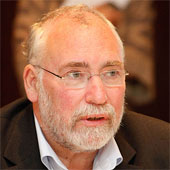The Myth of Asia: The Absence of an Asian Intellectual Space
Asian nations must decrease their intellectual dependence on the West.
January 21, 2015

There is no such thing as common Asian values, a uniform Asian paradigm or a collective Asian dynamic. The space that covers Asia is far too diverse to allow for generalization.
Read first part of this essay
What is true is that the last decade has seen a very intensive integration of Asian markets pretty much across the continent, from Yemen to Japan. East Asia (especially China) is the biggest consumer of West Asian oil.
Central Asian states – Kazakhstan, Uzbekistan, Turkmenistan and Kyrgyzstan – have loosened bonds with Russia, while strengthening them with China. This will further intensify with the development of the New Silk Road.
The creation of new institutions, notably the Asian Infrastructure Investment Bank (AIIB), will strengthen this trend. As Asian cross-border flows of goods, capital, investments, aid, technology, tourists, etc., accelerate, an increasingly integrated Asian market will be a prominent feature of the 21st century global economy.
“Asian media”
What does not appear to be emerging, however, in any profound sense is an Asian intellectual community – a market of ideas as opposed to a market of goods. True, a number of Asian pundits have made it their calling to berate the “Western media.” But there is nothing that could be called in any meaningful form the “Asian media.”
Internationally renowned Asian thought-leaders publish op-ed pieces in the Financial Times, the Wall Street Journal, Newsweek, Time, etc., but not in Chosun Ilbo, Sankei Shimbun, Kompas or Rénmín rìbào (leading newspapers in South Korea, Japan, Indonesia and China).
Indeed if, say, an Indian wants to find out what is going on in Indonesia following the recent election of the new president Joko Widodo (Jokowi), s/he will have to rely on Western media. (India is the world’s and Asia’s biggest democracy, while Indonesia is the world’s third biggest democracy and Asia’s second.)
There are no permanent correspondents of Indian media based in Jakarta. A comparable pattern prevails in Asia generally. Thus, Asian thought-leaders tend to be better known in the West than in Asian countries themselves, apart from their own.
A lack of leadership
To be sure, Asian leaders flock to express their views at Davos. Meanwhile, attempts to create a comparable Asian forum — e.g., the Boao Forum — have met with limited success at best.
Strictly speaking, there is no Asian forum for dialogue. Japan, as Asia’s most advanced economy, in particular has failed to show any intellectual or policy leadership. Japanese leaders tend to be conspicuous by their absence in international forums.
With the notable exceptions of Hong Kong and Singapore, there is no Asian student metropolis in Asia – neither Tokyo, nor Beijing, nor Delhi. There is no Asian equivalent to the Erasmus program, in which students from different European countries spend a period of time studying in a university in another European country.
Students from Asia studying abroad go overwhelmingly to Western (and Australian) universities — as opposed to other Asian universities. However, it is also true that Asian students of different nationalities can meet and congregate on Western campuses.
A former Japanese student wrote to me recently to say that the first time she had had a really serious conversation (and friendship) with a Korean occurred when she was doing a post-graduate degree at UCLA.
Where are the scholars?
The same applies to scholars. There are relatively few internationally or trans-Asia known experts of other Asian countries. We should all be reading Asian views on Asians, but the material is not readily available.
How many well-known Japanese authors or other Asian on, say, China can one name? Pallavi Aiyar, the Indian journalist and writer, author of a highly internationally successful book on China, Smoke and Mirrors, is a rare case!
Another outstanding exception among Asian scholars on Asia is the Indian scholar Rana Mitter, designated as one of “the world’s 25 smartest Indians,” a world-leading expert on China, author of many incisive books, most recently China’s War with Japan, 1937-1945: The Struggle for Survival (2013), an absolute masterpiece.
Where does Professor Mitter teach? Oxford. Indeed, there are far more Indian professors in the United Kingdom or United States than there are in other Asian countries. Ditto the Chinese and others.
What applies to the media, students and academia, also applies to business. There are a very small number of Western CEOs of Japanese companies, notably Carlos Ghosn, the Lebanese-Brazilian CEO of Renault and Nissan.
Yet, there are no Indian, Korean or Philippino CEOs or other top-ranking executives in charge of leading global companies headquartered in Asia. In contrast, senior Asian executives, including CEOs, are fairly numerous in both European and American enterprises.
Conclusion
As the process of the Asianization of markets can be expected to continue to deepen and expand, it becomes increasingly important for Asians to have a forum for dialogue and cross-fertilization.
It is increasingly important that Asians should know each other much better. It is increasingly important that they should study their reciprocal histories, cultures, literature and socio-economic dynamics.
To that end, Asians should decrease intellectual dependence on the West. Berating the West, as a number of Asian thought leaders are prone to do, is fine. However, it is far more important and constructive to create a vibrant trans-Asian intellectual community.
Takeaways
What is not emerging is an Asian intellectual community - a market of ideas as opposed to a market of goods.
Strictly speaking there is no Asian forum for dialogue.
Japan, as Asia's most advanced economy, has failed to show any intellectual or policy leadership.
With the exceptions of Hong Kong and Singapore, there is no Asian student metropolis in Asia - neither Tokyo, Beijing nor Delhi.
There are far more Indian professors in the UK or US than there are in other Asian countries.

